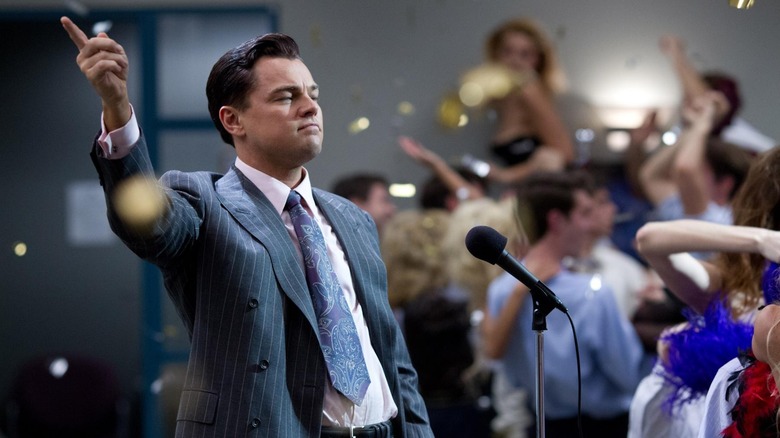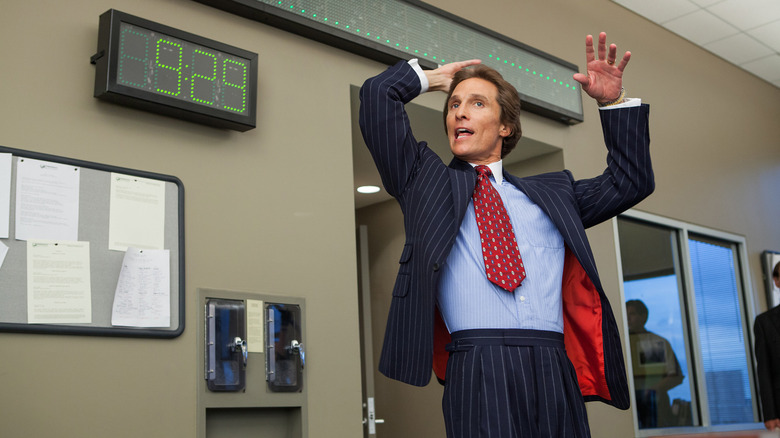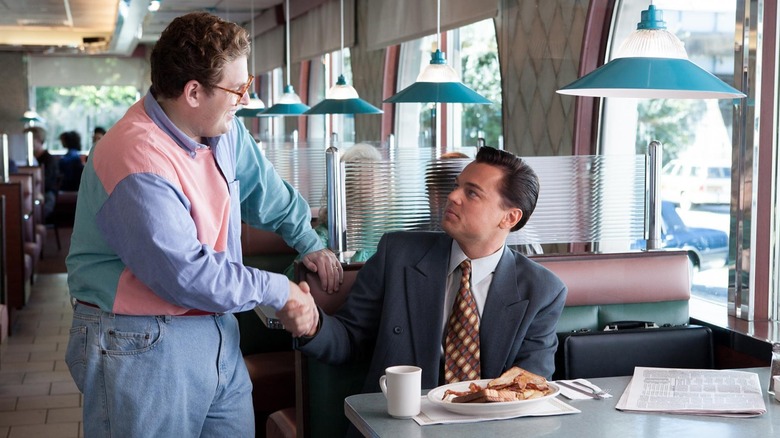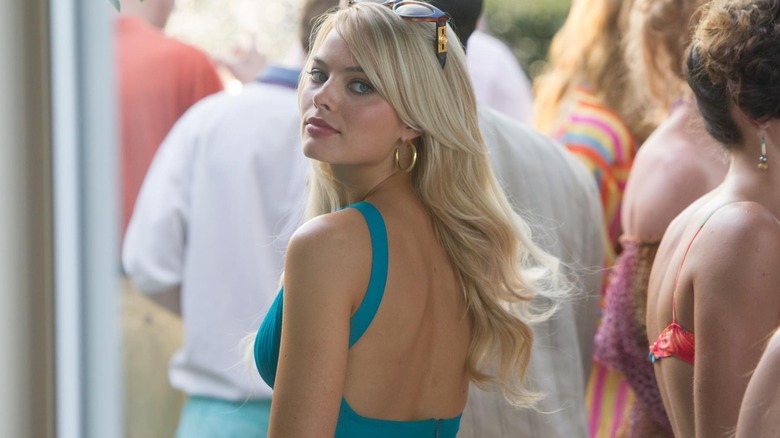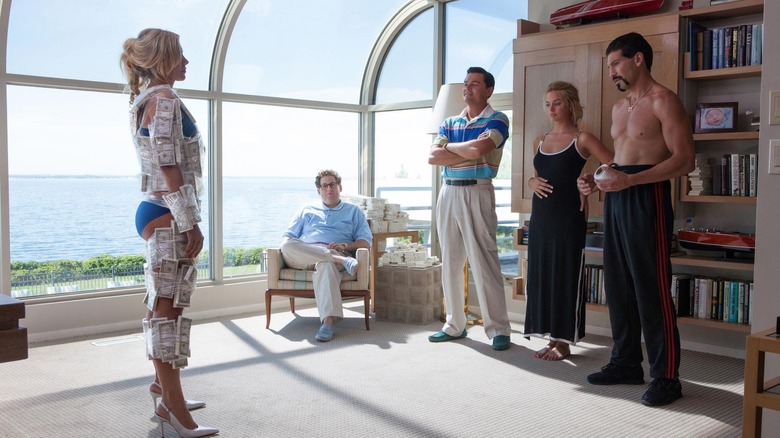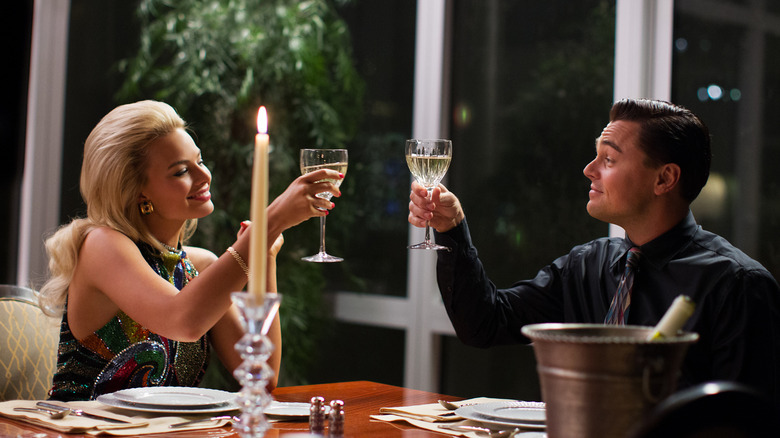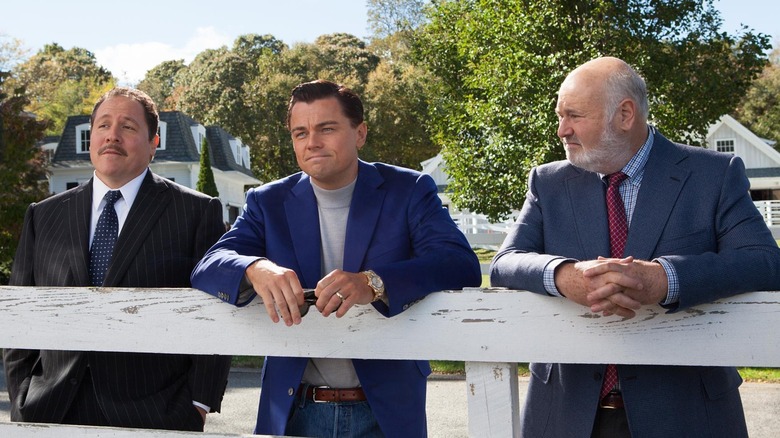How The Wolf Of Wall Street Became Martin Scorsese's Biggest Movie Ever
(Welcome to Tales from the Box Office, our column that examines box office miracles, disasters, and everything in between, as well as what we can learn from them.)
Few directors will ever put together a filmography as impressive as Martin Scorsese. From "Taxi Driver" to the Best Picture winner "The Departed" and everything in between (including stellar music documentaries like "The Last Waltz") we're talking about one of cinema's true titans. The history of film could not be written without mentioning his name multiple times. But in more than five decades of directing, one film stands tall above the rest as the biggest movie Scorsese ever made: "The Wolf of Wall Street."
The 2013 film reunited the filmmaker with one of his most trusted collaborators in Leonardo DiCaprio who would help him tell the story of Jordan Belfort, chronicling the real-life criminal's journey from a hungry young guy selling penny stocks to a wealthy, flashy stock-broker living the high life, right up to his startling downfall involving crime, corruption, and the FBI. It's a uniquely American tale full of drugs, debauchery, and greed.
In this week's Tales from the Box Office, in honor of the film's 10th anniversary, we're looking back at "The Wolf of Wall Street," why it took years to get made, why it ended up sparking some controversy, what happened once it hit theaters, and how it became the biggest movie of Scorsese's storied career. Let's get into it.
The movie: The Wolf of Wall Street
The journey starts with Jordan Belfort's book, which is where the movie got its name. Warner Bros. originally acquired the rights to the book in 2007 for $1 million, with DiCaprio attached at that time. He would stay with it till the very end. Terence Winter ("Boardwalk Empire") was tapped to pen the screenplay and, following their successful collaborations on "The Aviator" and "The Departed," Scorsese was looking to team up with DiCaprio yet again. And why not? Their most recent collaboration was a smash hit that finally got Scorsese a Best Picture winner at the Oscars, after all.
Warner Bros. was, however, reluctant to give the film the green light and Scorsese was quoted as saying he "wasted five months" of his life in the book "Conversations with Scorsese." So, he went on to make "Shutter Island" with DiCaprio instead while the project languished in development hell.
Ridley Scott was in consideration to direct the project after Scorsese walked away. When that didn't pan out, Warner Bros. abandoned the project. Things truly got going once Red Granite Pictures was brought into the project in 2011. With the production company willing to let the film move forward without restrictions, Scorsese came back on board and it was off to the races.
"I told Marty, 'I don't think we'll be able to do a movie like this too many times in the future,'" DiCaprio said to Vulture in 2013. "Larger-scale, R-rated dramas, like 'Blood Diamond' or 'The Departed' don't really get financed anymore." Indeed, Hollywood was investing more in franchises that could guarantee a certain level of return on a global scale. Mind you, this was before "Deadpool" ($782 million worldwide) or "It" ($700 million worldwide) arrived to set a new high bar for what an R-rated movie could accomplish at the box office.
Scorsese tackles a new kind of crime
In fairness to risk-averse studios, this movie carried a $100 million budget and that is approaching superhero movie money. That's a very expensive bet to make, even if we are talking about one of the greatest filmmakers to ever do it and one of the most celebrated actors of his time. Paramount Pictures — who ultimately signed on to distribute the film — as well as Red Granite were banking on this being a mass-appeal hit.
Fortunately, Scorsese's crime pictures are among some of his most beloved, with "Goodfellas" being the premiere example. But with "Wolf of Wall Street," Scorsese would not be tackling gangsters or anything like that. Instead, this would give the director a chance to take on white-collar crime, which is something he hadn't much ventured into up to this point. Speaking further in that same Vulture interview, DiCaprio explained that he and Belfort felt that Scorsese was the man best suited to the job.
"Marty directing was Jordan's dream scenario, absolutely. When Marty couldn't do it the first time, I set it up with a few other directors, but I never felt comfortable pulling the trigger. I was fixated on him. There wasn't anybody else who could bring the rawness and toughness, the music, and particularly the humor required to convey the excitement of these young punks — these robber barons — taking on the Wall Street system."
The film does have an irreverence to it, and that was very much a choice on Scorsese's part. It does not shy away from the excess and, at times, the glamor of the life that Belfort was leading at the expense of others. Some viewed that as an issue, and accused it of glorifying this sort of high-level financial crime. Scorsese saw it a little differently.
'It should touch a nerve!'
"It should touch a nerve! What would be the point of making a film that exposes corruption in the financial world, in a conventional way? It's already been done!" Scorsese said to IndieWire in 2014 of the controversy surrounding the film. For him, it was all about showing audiences that men like Belfort — who served less than two years in prison for his crimes — don't suffer consequences the same way many of us do.
They live in a different world. It wasn't about glorifying the situation. That said, all of that over-the-top imagery would go a long way in putting butts in seats when the movie did hit theaters. In that same interview, Scorsese was posed with the question of making such a difficult film. At the time, he was 71 years old and was by no means a young man. But his answer made clear that he's not interested — then or now — in taking the easy road.
"Why make it otherwise? There's not enough money in the world to get bored doing your own work. It's a big challenge to tell the story in a different way, especially when there were similarities to things I did in the past. I had to find a more furious energy that reflects the rapaciousness of the mindset. Terry, myself, and Leo worked on it and then we did a lot of work in rehearsals with the actors — about three or four weeks on and off on certain key scenes. That was done with Jonah [Hill], Leo, and also with all the actors playing the brokers."
Setting the table for success
It's worth pointing out that DiCaprio was arguably at the height of his powers at this time. He was coming off of a monster run that really got going with "Shutter Island" ($299 million worldwide) and included Christopher Nolan's "Inception" ($825 million worldwide), which remains one of the actor's biggest hits to date, trailing only "Titanic" ($2.2 billion worldwide). He also starred in "Django Unchained ($425 million worldwide) and "The Great Gatsby" ($353 million worldwide) during that stretch. Audiences were in love with the actor seemingly no matter what he was doing. And this movie allowed him to go for it in a way he hadn't ever before and hasn't since.
But it wasn't just DiCaprio. The actor was surrounded by an all-star cast that included a head-turning performance by Jonah Hill ("Superbad"), a heroic bit-part by Matthew McConaughey ("True Detective") as stock broker Mark Hanna, as well as a star-making turn for Margot Robbie as Belfort's wife Naomi Lapaglia, who was largely unknown to audiences at that time. In the years since, she has become one of the world's biggest stars. This year's "Barbie," which she starred in and produced, is the biggest movie of 2023 and one of the highest-grossing movies of all time. But this was her coming out party. The rest of the pieces of the puzzle were perfectly slid into place.
The movie also very much benefited from the fact that Scorsese was not required to hold back — and he very much did not. Nudity, excessive drug use, and a world-record amount of swearing led to an undeniably marketable film. It was, all at once, an uncompromising Scorsese effort that featured arguably a career-best performance by DiCaprio up to that point, making for an R-rated tale of crime with mass appeal.
The financial journey
Paramount released "The Wolf of Wall Street" on December 25, 2013. Yes, despite the raucous nature of the film, it was a Christmas release. The film was facing a great deal of competition at that time from movies like "The Hobbit: The Desolation of Smaug," Disney's animated smash hit "Frozen," eventual Best Picture nominee "American Hustle," and "Anchorman 2: The Legend Continues," among others. Be that as it may, Scorsese's take on Belfort's story made $9.1 million on opening day, second only to "The Hobbit."
On its first full weekend, the film earned a solid $18.3 million domestically, placing fifth on the charts. While that might sound like a path to death in the modern marketplace, a movie like this could open over the lucrative holiday window without needing to take the top spot, banking on legging it out through the early part of the following year. And that's exactly what happened.
"Wolf of Wall Street" finished its initial run with $116.9 million domestically to go with an outsized $275.1 million internationally for a grand total of $392 million. Thanks to an eventual re-release, the film later crossed the $400 million mark. To make matters even better, it also was nominated for five Academy Awards including Best Adapted Screenplay, Best Supporting Actor (Hill), Best Actor (DiCaprio), Best Director, and Best Picture. Though the film went home empty-handed.
Similarly, Belfort did not actually profit from the film or his book. He owed restitution totaling more than $100 million and, though some were expressing outrage at him profiting from the project, he explained that all of the money was going to pay down his massive debt. "I insisted on turning over 100% of the profits of both books and the movie, which is to say, I am not making a single dime on any of this," he said on Facebook around the time of the movie's release.
The lessons contained within
For Scorsese, it represented a new commercial high-point in a career filled with cinematic classics. Interestingly enough, his previous high watermarks were "Shutter Island" and "The Departed," his other two most recent collaborations with DiCaprio. All five of Scorsese's highest-grossing movies, a list that also includes "The Aviator" and "Gangs of New York," all-star DiCaprio.
That being the case, it's worth taking a moment to appreciate just how special this creative partnership between Scorsese and DiCaprio has been. We simply don't get pairings like this all that often, and it's worth ruminating on the fact that this director/actor combo has not only resulted in some amazing films but it's been extremely lucrative as well. Critical acclaim and commercial success are both, independently, very hard to come by. Earning both at this level? That's the rarest of rare air.
More than anything, it's well worth Marveling at what Scorsese accomplished here. We're talking about a filmmaker who had decades of legendary filmmaking behind him. In his 70s, Scorsese made the biggest movie of his remarkable career, one that has the energy of a man in his 20s fueled by drugs and money. Only a true master is capable of turning in some of their best work that far into a career. The fact that he's delivered widely-acclaimed works such as "Killers of the Flower Moon" a decade later in his 80s? It's a testament to the greatness that is Martin Scorsese.
Whenever we look back on the career of this particular legend yes, we'll talk about "Goodfellas." We'll talk about "The Last Temptation of Christ." We'll talk about "Raging Bull." But we also must talk about "The Wolf of Wall Street," lest we risk not giving credit where credit is very much due.
